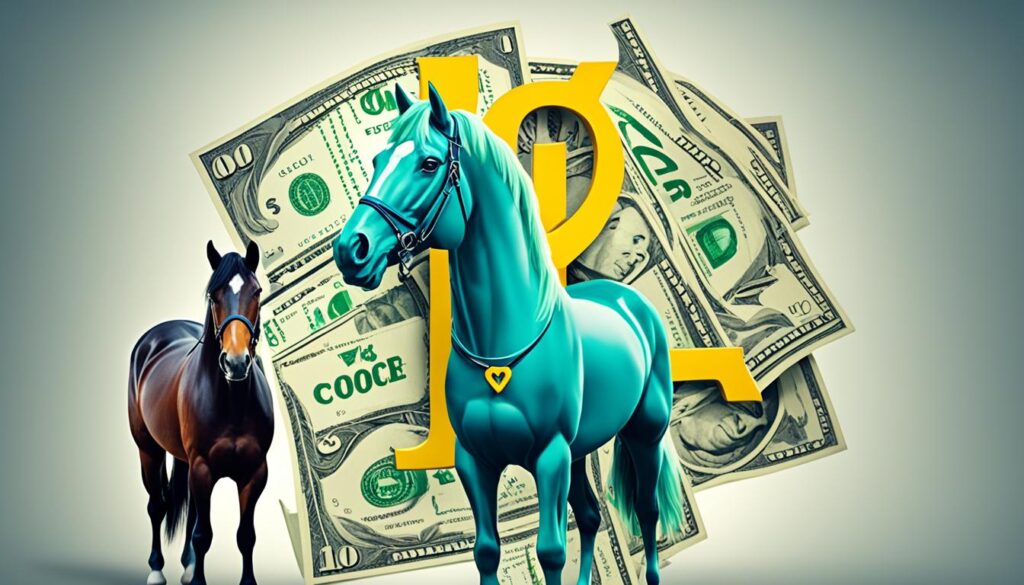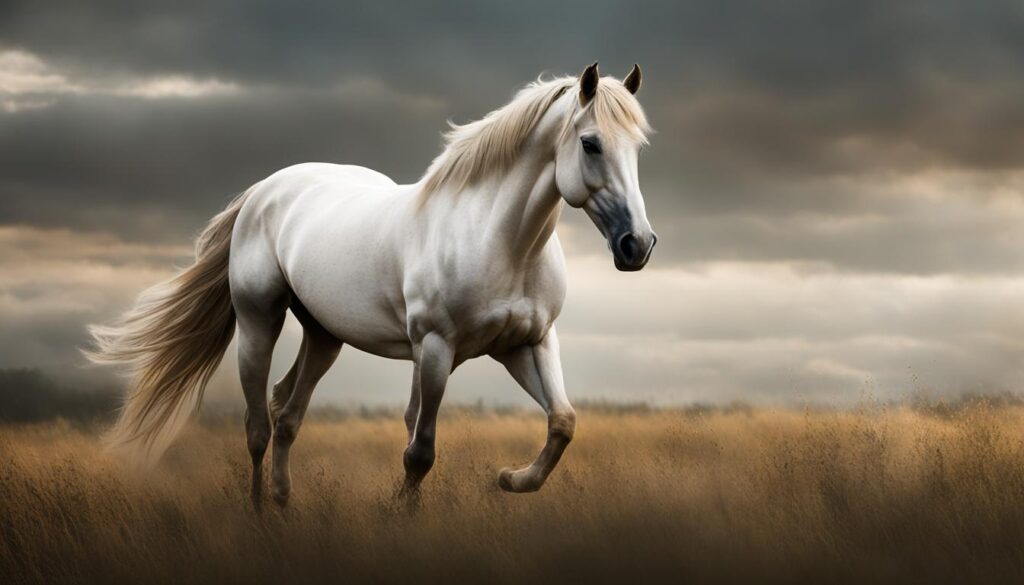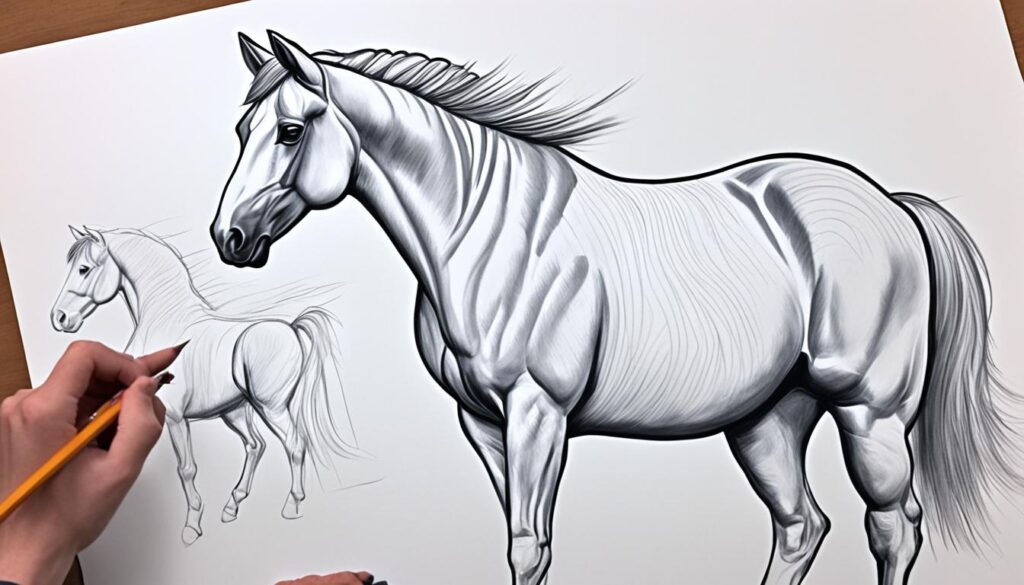Have you ever dreamed of galloping through open fields, the wind in your hair and the rhythmic beat of hooves beneath you? Owning a horse can be a truly magical experience, full of love, companionship, and unforgettable adventures. But before you saddle up and ride off into the sunset, it’s important to understand the financial realities of horse ownership.
Horses are not just majestic creatures; they also come with a cost. From the initial purchase price to the ongoing expenses, being aware of the financial commitment involved is essential. But don’t let that discourage you. With proper planning and budgeting, you can embark on this incredible journey without breaking the bank.
Key Takeaways:
- Understanding the costs associated with owning a horse is crucial before taking the leap.
- Proper planning and budgeting can help you manage horse expenses effectively.
- Horse ownership is a rewarding experience that requires both financial and emotional commitment.
- By educating yourself about the various costs involved, you can make informed decisions and ensure a financially manageable experience as a horse owner.
- Stay tuned as we explore the various factors affecting horse pricing, the initial purchase price, ongoing care and maintenance, boarding and housing expenses, training and riding lessons, equipment and tack, medical and healthcare costs, insurance and liability considerations, and miscellaneous expenses.
Factors Affecting Horse Pricing
The price of a horse can vary significantly based on various factors. Understanding these factors is important when considering the cost of buying a horse and searching for affordable horse prices. Let’s explore the key elements that influence horse pricing:
Breed
The breed of a horse plays a significant role in determining its price. Certain breeds are highly sought after and have a higher demand, resulting in higher prices. Breeds known for their performance, such as Thoroughbreds or Warmbloods, tend to have higher price tags compared to other breeds.
Age and Training Level
The age and training level of a horse also impact its pricing. Younger horses that are ready to be trained or have a solid foundation of training often command higher prices. On the other hand, older horses or those with limited training may be more affordable options.
Conformation
A horse’s conformation refers to its physical structure and appearance. Horses with excellent conformation, meaning a well-balanced body, correct proportions, and good movement, are typically priced higher. Conformation is often considered an important factor in determining a horse’s overall value.
Intended Use
The intended use of a horse can significantly impact its price. Horses bred for specific disciplines such as dressage, jumping, or racing may have higher price tags due to their specialized training and suitability for those activities. Horses intended for recreational riding or companionship may be priced more affordably.
Overall Health
The health of a horse is an essential consideration when determining its price. Horses with no underlying health issues or soundness concerns typically have higher prices. A well-maintained health record and regular veterinary check-ups are indicators of a horse’s value and can influence pricing.
“Understanding the various factors that affect horse pricing is crucial. By considering the breed, age, training, conformation, intended use, and overall health, you can make informed decisions that align with your budget.”
Exploring these factors will help you navigate the horse market and determine a suitable budget for purchasing a horse. Whether you’re looking for an affordable option or willing to invest in a high-quality horse, comprehending the elements that influence pricing will guide your decision-making process.
The Initial Purchase Price
Owning a horse begins with the initial purchase price. Before you bring home your equine companion, it’s important to understand the costs associated with buying a horse. Let’s explore the average horse price across different categories, ranging from leisure horses to performance horses and specialized breeds.
Leisure Horses
If you’re looking for a horse purely for recreational purposes and leisurely trail rides, you can find affordable options that fit a reasonable budget. The average horse price for leisure horses typically ranges from $1,000 to $5,000. These horses are often well-suited for beginners or riders seeking a gentle and easygoing companion.
Performance Horses
For those interested in competitive or performance riding disciplines such as dressage, show jumping, or reining, the average horse price increases significantly. Performance horses have specialized training and skills that make them suitable for high-level competition. Expect to pay anywhere between $5,000 and $20,000, depending on the horse’s age, training level, and past performance.
Specialized Breeds
Specialized breeds, such as Arabians, Andalusians, or Friesians, often come with a higher price tag due to their unique characteristics and desired bloodlines. The average horse price for these breeds can range from $10,000 to $50,000 or more. Keep in mind that the cost may vary based on factors like lineage, show record, and conformation.
It’s important to note that these are average price ranges and individual horses’ prices may vary. Factors such as the horse’s age, training, competition history, and overall health can all impact its price. When considering buying a horse, it’s essential to set realistic expectations and budget accordingly.
To give you a better idea of how horse pricing can vary, here’s a table highlighting the average prices for different categories:
| Horse Category | Average Price Range |
|---|---|
| Leisure Horses | $1,000 – $5,000 |
| Performance Horses | $5,000 – $20,000 |
| Specialized Breeds | $10,000 – $50,000+ |
Remember, these prices are just averages, and you may find horses outside these price ranges. Before making a purchase, it’s advisable to consult with knowledgeable professionals, such as trainers or experienced horse owners, to ensure you make an informed decision.
Now that you have an understanding of the initial purchase prices, let’s explore the ongoing care and maintenance expenses involved in horse ownership in the next section.
Ongoing Care and Maintenance
Once you’ve brought your new horse home, the expenses don’t stop at the purchase price. Owning a horse requires continuous care and maintenance to ensure their well-being. Let’s explore the ongoing costs associated with horse ownership:
Daily Feed and Supplements
Proper nutrition is crucial for your horse’s health and performance. Depending on their size, activity level, and dietary needs, feed costs can vary. Additionally, some horses may require supplements for joint health, coat condition, or digestive support. These ongoing expenses can contribute significantly to your horse ownership costs.
Farrier and Hoof Care
Regular visits from a qualified farrier are necessary to maintain your horse’s hoof health. They will trim and balance the hooves, and some horses may require shoeing. Farrier costs will depend on your location, the type of shoeing required, and the condition of your horse’s hooves. Including this expense in your budget is essential for keeping your horse sound and comfortable.
Veterinary Care
Just like any other pet, horses require routine veterinary care to stay healthy. Regular vaccinations, dental exams, and deworming are necessary preventive measures. Additionally, unforeseen medical issues may arise, resulting in emergency veterinary expenses. Including both routine and emergency veterinary care in your horse ownership budget will help ensure your horse’s well-being.
Medical Insurance
Consider insuring your horse to help offset potential medical costs. Medical insurance can provide financial protection in case of accidents, illnesses, or surgeries. While insurance premiums can vary based on the horse’s value and coverage, it can offer peace of mind and protect your finances in the event of unexpected medical expenses.
These are just a few of the ongoing expenses you can expect when owning a horse. It’s important to budget for these costs to ensure that your horse receives proper care and remains in good health.
| Expense | Average Cost (Per Year) |
|---|---|
| Daily Feed | $1,500 – $3,000 |
| Supplements | $500 – $1,500 |
| Farrier | $600 – $1,200 |
| Veterinary Care | $500 – $1,000 |
| Medical Insurance | $300 – $600 |
Boarding and Housing Expenses
When it comes to owning a horse, where you choose to house them can have a significant impact on your overall expenses. In this section, we’ll explore the various costs associated with boarding your horse and the expenses involved in building and maintaining your own stable.
Boarding your horse in a professional facility can provide convenience and access to amenities, but it comes at a cost. Full-care boarding, where all aspects of your horse’s care are taken care of, can be a convenient option for busy horse owners but typically comes with a higher price tag. On the other hand, self-care boarding requires more involvement from you, including feeding and stall cleaning, but can be a more affordable option.
Alternatively, pasture boarding allows your horse to roam freely in a designated pasture area. While this may seem like a more budget-friendly option, keep in mind that additional expenses such as feeding supplements and regular veterinary care may still apply.
If you have the space and resources, building and maintaining your own stable can offer complete control over your horse’s housing. However, it also comes with initial construction costs, ongoing maintenance expenses, and the responsibility of daily care.
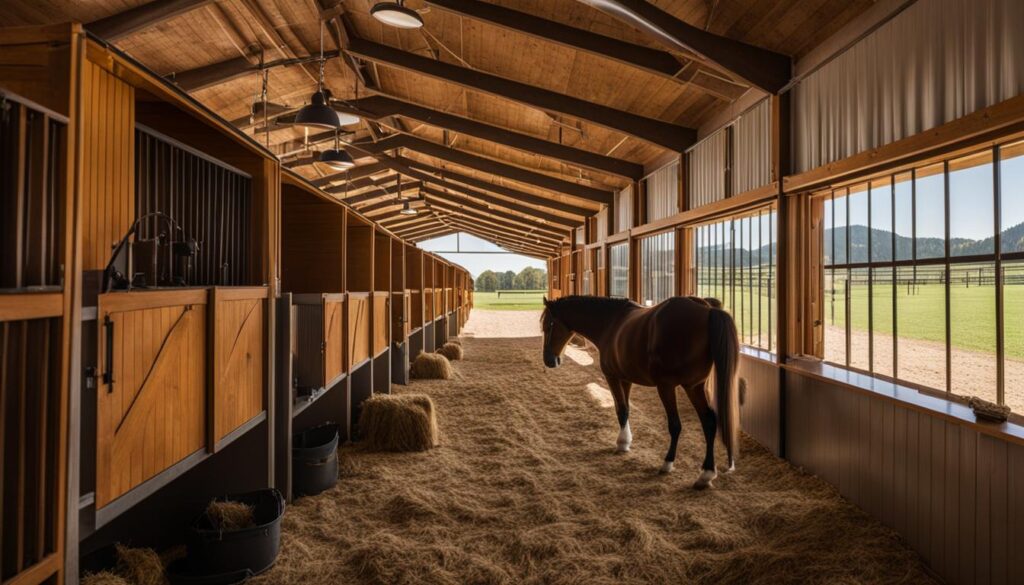
The Cost of Boarding
When it comes to boarding your horse, the cost will vary depending on factors such as location, the type of facility, the services provided, and the region you live in. It’s essential to consider your budget and the level of care you desire for your horse.
“Boarding my horse in a full-care facility costs me around $800 to $1,200 a month, which includes feed, stall cleaning, and daily turnout. While it may seem expensive, I find comfort in knowing that my horse is receiving top-notch care.”
If you opt for self-care boarding, the costs can range from $300 to $600 per month, depending on your location and the available amenities. Keep in mind that you’ll be responsible for feeding, stall cleaning, and turnout.
Building Your Own Stable
If you have the means and desire to build and maintain your own stable, it can be an excellent long-term investment. However, it’s crucial to consider the initial costs and ongoing expenses.
The construction of a basic horse barn can cost anywhere from $20,000 to $100,000 or more, depending on the size and materials used. Additional expenses to consider include permits, site preparation, fencing, and utilities.
Ongoing maintenance costs include regular repairs, stall bedding, manure disposal, and utilities such as water and electricity. It’s important to budget for these expenses in your overall horse ownership costs.
Training and Riding Lessons
Proper training and regular riding lessons are crucial for the development and well-being of your horse. Not only do they enhance your bond with your equine companion, but they also improve your horsemanship skills. In this section, we’ll explore the costs associated with professional training and riding lessons, helping you understand the expenses involved in your horse’s education.
Professional Training
Enlisting the help of a professional trainer can significantly benefit your horse’s training and overall performance. Whether you have a young horse or need specific discipline training, professional trainers have the experience and expertise to guide you. However, it’s essential to consider the costs involved.
On average, professional training for horses can range from $800 to $1,500 per month, depending on various factors such as location, trainer reputation, and the level of training required. While this may seem like a significant expense, investing in professional training can yield long-term benefits by improving your horse’s behavior, skills, and performance.
Riding Lessons
Regular riding lessons are not only beneficial for your horse’s training but also for your personal growth as a rider. Riding lessons provide you with the opportunity to enhance your riding skills, learn new techniques, and gain confidence in the saddle. They are especially valuable if you’re a beginner or looking to advance your riding abilities.
The cost of riding lessons can vary depending on factors such as the instructor’s credentials, lesson length, and the location of the facility. On average, you can expect to pay around $40 to $100 per lesson. Some instructors may offer package deals or discounts for prepaid lessons, helping you save some money in the long run.
It’s important to note that the frequency of riding lessons will impact the overall cost. While weekly lessons are a common practice, the frequency can be adjusted according to your goals, budget, and availability.
Did You Know? Riding lessons not only improve your riding skills but also provide structured exercise and stress relief, benefiting your physical and mental well-being.
By budgeting for professional training and riding lessons, you can ensure that you and your horse receive the necessary education for a successful and fulfilling partnership. Investing in these costs will contribute to your horse’s progress and your growth as a rider.
| Training and Riding Lessons Expenses | Average Cost |
|---|---|
| Professional Training | $800 – $1,500 per month |
| Riding Lessons | $40 – $100 per lesson |
Equipment and Tack
Alongside the regular care and training, horses require specific equipment and tack for various activities. Investing in high-quality gear is essential for the comfort and safety of both you and your horse. Let’s explore the costs associated with essential equipment and tack.
Saddles
A well-fitting saddle is crucial for a comfortable riding experience. Prices for saddles can vary greatly depending on factors such as the material, craftsmanship, and brand. On average, you can expect to spend between $500 to $5000 for a quality saddle. Keep in mind that specialized saddles for specific disciplines may have higher price tags.
Bridles
A bridle is a vital piece of equipment that allows you to control your horse while riding. Prices for bridles can range from $50 for basic models to several hundred dollars for high-end options. Consider the material, craftsmanship, and features when selecting a bridle that suits your needs and budget.
Blankets
Blankets are essential for protecting your horse from inclement weather and keeping them warm during colder months. Prices for blankets can vary depending on the material, weight, and brand. Expect to spend between $50 to $200 for a quality blanket that provides adequate protection and insulation.
Grooming Supplies
Maintaining your horse’s cleanliness and appearance requires a range of grooming supplies. These include brushes, combs, hoof picks, shampoos, and detanglers. The cost of grooming supplies can vary depending on the brand and quality. On average, plan to spend around $50 to $100 for a basic set of grooming tools.
Other Essential Tack
In addition to saddles, bridles, blankets, and grooming supplies, there are other essential tack items you’ll need for riding and training your horse. These include halters, lead ropes, lunging equipment, and protective boots. Prices for these items can range from $20 to $200, depending on the brand and quality.
Investing in high-quality equipment and tack is essential for the safety, comfort, and well-being of both you and your horse. While the initial costs may seem significant, remember that durable and well-maintained gear will serve you and your horse for years to come. By budgeting for these expenses and making informed purchasing decisions, you can ensure a positive and enjoyable experience as a horse owner.
Medical and Healthcare Costs
Just like any other pet, horses require regular medical attention and healthcare. In this section, we’ll delve into the costs associated with maintaining your horse’s health and well-being.
Routine Veterinary Care
Regular veterinary care is essential for keeping your horse in good health. This includes annual check-ups, vaccinations, and routine exams. The cost of routine veterinary care can vary depending on your location and the specific services provided. On average, you can expect to pay between $500 and $1,000 per year for routine veterinary care.
Dental Work
Horses require regular dental work to maintain proper oral health and prevent dental issues. This includes routine dental exams, floating (filing down sharp edges), and, if necessary, extractions. The cost of dental work for horses can range from $100 to $300 per year.
Vaccinations and Deworming
Vaccinations and deworming are essential for preventing diseases and parasites in horses. The cost of vaccinations and deworming products can vary, but you can expect to spend around $200 to $300 per year on these preventive measures.
Emergency Medical Expenses
Unfortunately, emergencies can happen, and horses are not immune to accidents or illnesses. Emergency medical expenses can be significant and include veterinary exams, diagnostic tests, surgeries, medications, and hospitalization. It’s essential to have an emergency fund or insurance coverage to help cover these unexpected costs.
It’s wise to plan ahead and budget for medical and healthcare costs when owning a horse. Regular veterinary care, dental work, vaccinations, deworming, and emergency expenses are all part of ensuring the ongoing health and well-being of your equine companion.
| Expense | Average Cost |
|---|---|
| Routine Veterinary Care | $500 – $1,000 per year |
| Dental Work | $100 – $300 per year |
| Vaccinations and Deworming | $200 – $300 per year |
| Emergency Medical Expenses | Varies |
Having a clear understanding of the medical and healthcare costs associated with owning a horse will enable you to budget appropriately and provide the necessary care for your equine companion.
Insurance and Liability Considerations
When it comes to owning a horse, it’s not just about the initial purchase price and ongoing care expenses. Insurance and liability considerations are also important aspects to take into account. In this section, we’ll discuss the costs associated with insuring your horse and protecting yourself and others in case of accidents or injuries involving your equine companion.
Insuring your horse helps safeguard your investment and provides financial protection in case of illness, injury, theft, or mortality. The cost of horse insurance can vary depending on factors such as the horse’s age, breed, use, and value. Additionally, your location and desired coverage level can also impact the premium you’ll need to pay. It’s crucial to research and compare different insurance providers to find the best policy that suits your specific needs and budget.
Did You Know? Some insurance policies may cover not only veterinary fees but also costs associated with loss of use, third-party liability, and even emergency transportation. Make sure to carefully review the policy terms and conditions to ensure you have adequate coverage.
In addition to insuring your horse, liability insurance is also essential to protect yourself and others in case of accidents or injuries involving your horse. Liability coverage can help cover legal costs, damages, and medical expenses if you are held responsible for an incident related to your horse. It’s crucial to check with your insurance provider to determine the necessary coverage and the associated costs for liability insurance.
Understanding the expenses related to insurance and liability is an important part of managing the financial risks associated with horse ownership. By investing in comprehensive insurance coverage and protecting yourself from potential liabilities, you can have peace of mind and confidently enjoy your time with your beloved equine friend.
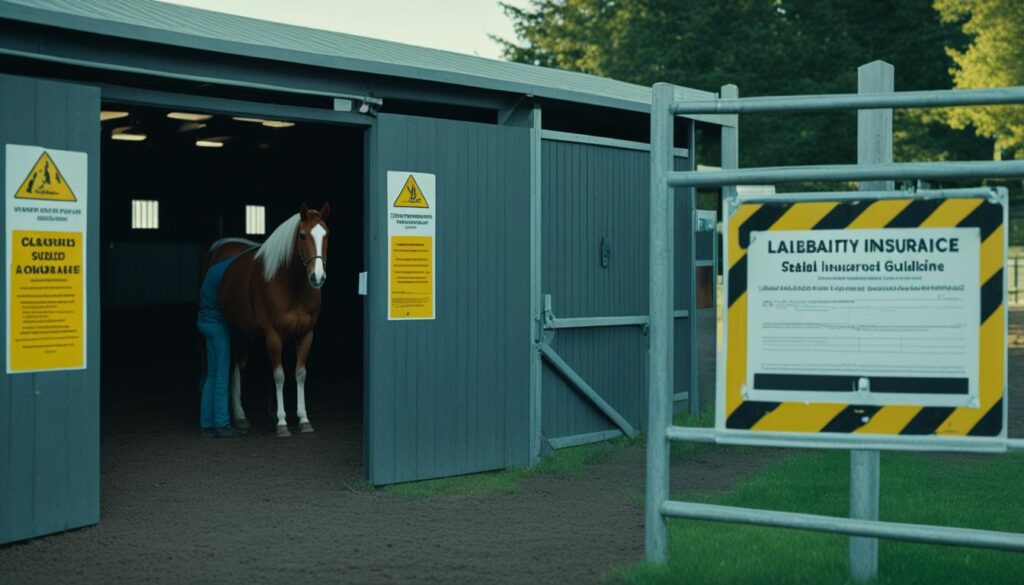
| Type of Insurance | Average Cost Range |
|---|---|
| Horse Mortality Insurance | $500 – $5,000 annually |
| Horse Medical Insurance | $300 – $1,000 annually |
| Third-Party Liability Insurance | $100 – $500 annually |
Miscellaneous Expenses
Beyond the major expenses, horse ownership also involves various miscellaneous costs that can add up over time. Being aware of these expenses will help you plan and budget accordingly.
Bedding
Providing comfortable bedding for your horse is essential for their well-being. The cost of bedding materials such as straw, shavings, or wood pellets can vary depending on your location and the size of your horse’s stall.
Barn Supplies
Stocking up on barn supplies is necessary to keep your horse’s living area clean and well-maintained. This can include items such as brooms, pitchforks, buckets, wheelbarrows, and cleaning solutions.
Trailering
If you plan on traveling with your horse, you may need to consider the cost of trailering. This includes fuel, maintenance, and potential rental fees for horse trailers.
Show Fees
If you participate in horse shows or competitions, there are additional fees to consider. These can include entry fees, stabling fees, transportation costs, and any necessary equipment or attire.
Other Miscellaneous Costs
There are various other miscellaneous expenses that may arise throughout your horse ownership journey. These can include costs for equine supplements, grooming supplies, fly control products, riding apparel, and additional training or lessons.
Having a comprehensive understanding of these miscellaneous expenses will enable you to budget effectively and ensure that you are financially prepared for all aspects of horse ownership. Remember that while these costs can add up, the joy and companionship that horses bring make it all worthwhile.
Conclusion
In conclusion, owning a horse can be a truly fulfilling experience that comes with both initial expenses and ongoing costs. From the moment you consider buying a horse, it’s important to understand the financial commitment involved. The initial purchase price can vary greatly depending on factors such as breed, age, and training level. By setting a realistic budget and exploring affordable options, you can find a horse that suits your needs and budget.
Once you bring your horse home, the ongoing care and maintenance become a significant part of the expenses. From feed and supplements to farrier and veterinary care, these costs ensure the well-being of your equine companion. Additionally, you’ll need to consider boarding and housing expenses, whether you choose to board your horse or build your own stable.
Training and riding lessons are vital for your horse’s development and your own horsemanship skills. Budgeting for professional training and regular lessons can help you and your horse grow together. Moreover, owning a horse requires specific equipment and tack, such as saddles and grooming supplies. Understanding these costs will enable you to budget for the necessary gear.
Lastly, medical and healthcare costs should not be overlooked. Regular veterinary care, vaccinations, and emergency expenses are all part of owning a horse. Insuring your horse and considering liability insurance are also important aspects to protect yourself and others.
By taking into account all these factors and budgeting accordingly, you can ensure a financially manageable experience as a horse owner. The total cost of horse ownership is a crucial consideration, and with the right planning, you can enjoy the rewards of owning a horse without any financial surprises along the way.
FAQ
How much does a horse cost?
The cost of a horse can vary depending on various factors such as breed, age, training, and conformation. On average, you can expect to pay anywhere from $1,000 to $20,000 or more for a horse. Specialty breeds or horses with exceptional training can command even higher prices.
What are the average horse prices?
The average horse prices range widely depending on the purpose and quality of the horse. Leisure horses typically range from $1,000 to $5,000, while performance horses can cost between $5,000 and $15,000. Specialty or highly trained horses can be priced even higher.
What are the ongoing expenses associated with owning a horse?
Owning a horse involves various ongoing expenses such as feed and supplements, farrier care, veterinary care, and other necessities like fly spray and grooming supplies. On average, monthly expenses can range from $300 to $1,000 or even more, depending on the level of care and your horse’s specific needs.
How much does boarding a horse cost?
Boarding costs can vary depending on the type of facility and amenities provided. Full-care boarding, where all aspects of horse care are covered, can range from $300 to $1,200 or more per month. Self-care boarding, where you provide some of the care yourself, typically costs less but requires more personal involvement.
What are the costs associated with training and riding lessons?
Professional horse training can cost anywhere from $500 to $2,000 per month, depending on the trainer’s expertise and the level of training required. Riding lessons can range from $40 to $100 per session. It’s essential to budget for ongoing education to ensure the proper development of both you and your horse.
How much does horse equipment and tack cost?
The cost of horse equipment and tack can vary depending on the quality and brand. Basic items such as halters, grooming supplies, and blankets can range from $50 to $200. More specialized equipment like saddles and bridles can start at $500 and go up to several thousand dollars.
What are the medical and healthcare costs for a horse?
Routine veterinary care, including vaccinations, dental work, and deworming, can cost around $500 to $1,000 per year. Emergency medical expenses can vary widely but should be budgeted for as well. Additionally, it’s crucial to consider the cost of insurance to protect your horse’s health and your financial investment.
How much does horse insurance cost?
The cost of horse insurance varies depending on factors such as the horse’s value, intended use, and coverage options. On average, you can expect to pay anywhere from $300 to $2,000 or more per year for horse insurance. It’s important to shop around and compare policies to find the best coverage for your needs.
What are the miscellaneous expenses associated with horse ownership?
Miscellaneous expenses can include bedding, barn supplies, trailering fees, show fees, and other incidentals. The costs can vary depending on your specific activities and needs. Budgeting an additional $100 to $500 per month for miscellaneous expenses is recommended.

